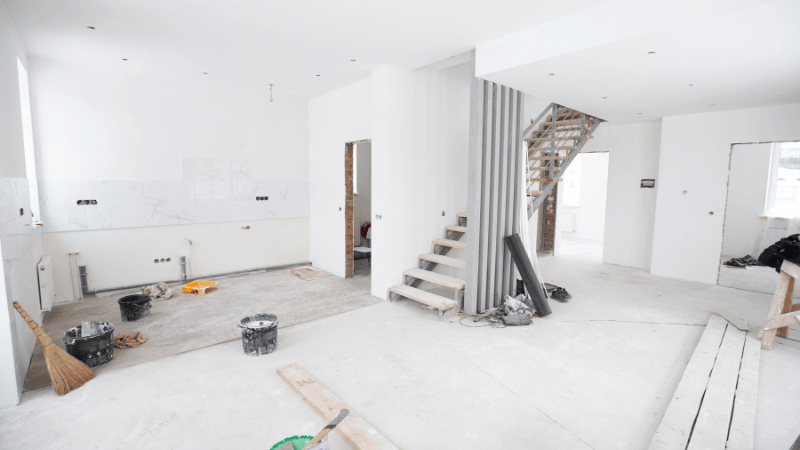Categories
How To Refinance a Property in the UK

It's common to refinance a property during your mortgage term. Over time, interest rates will fluctuate, and you will build up equity in your property, allowing you to switch to more advantageous products.
The average mortgage term is 30 years, but you won't typically be on the same mortgage deal for the entire length of your mortgage.
There are many reasons you may want to switch your mortgage deal. Some deals only last between 2 - 10 years, at the end of which you'll need to find a new deal. But you can also remortgage to release equity in your home or secure more attractive interest rates.
Looking to Refinance?
What Does it Mean to Refinance a Property?
Refinancing a property involves replacing an existing mortgage with a new one to obtain better terms, such as a lower interest rate, shorter loan term, or to tap into equity. It can also involve switching from a variable-rate to a fixed-rate mortgage or consolidating debt.
Refinancing aims to save money on monthly payments, reduce the overall interest paid over the life of the loan, or achieve other financial goals related to the property.
In This Guide:
Can I Remortgage to Raise Funds?
Can I Remortgage My House to Pay off Debt?
Refinancing a Bridging Loan to a Mortgage
Remortgaging When You're an Expat
Does Refinancing Hurt Your Credit?
Does Your House Get Revalued When You Remortgage?
Do You Pay More Interest if You Remortgage?
How Long Does It Take to Refinance a House?
Can I Remortgage to Raise Funds?
Yes, you can remortgage your property to raise funds. When you remortgage for this purpose, you essentially increase the size of your mortgage loan, borrowing more than you currently owe on the property.
The additional funds can be used for various purposes, such as home improvements, debt consolidation, or investments. You should assess whether the funds you release will be used wisely and whether you can afford the increased mortgage payments.
A borrower with £150,000 outstanding on their mortgage might re-mortgage for £200,000 to give them £50,000 to spend on something else.
Two of the most common reasons for raising additional funds via a re-mortgage include:
- Home improvements – building extensions or making significant alterations to your home can require significant sums of money beyond the means of many. Hence, the answer is often to borrow the required sum via a mortgage, which is one of the very cheapest ways of borrowing money
- Raising a deposit for a home – you might want funds for a deposit on a second home, a buy-to-let or a first home for a family member. It might not be a realistic option to accumulate the necessary sum via savings, so again, you can do this via a re-mortgage
Can I Remortgage My House to Pay off Debt?
Yes, you can remortgage your house to pay off debt. This is also known as "debt consolidation". You can refinance your existing mortgage to increase the loan amount, using the additional funds to pay off high-interest debt such as credit cards, personal loans, or other outstanding debts.
Compare the monthly repayments on £50,000 mortgage debt versus £50,000 credit card debt. Credit cards are renowned for having extortionate interest rates, so it's likely that £50,000 of mortgage debt would be cheaper to pay back.
However, you need to proceed with great caution here. Consolidating debt into a new loan may result in a longer repayment period, especially if you extend the term of your mortgage. While this can lower your monthly payments, it also means you'll be in debt for a longer period and may end up paying more interest over time.
Additionally, when you consolidate debt by remortgaging your house, you're converting unsecured debts (like credit cards or personal loans) into secured debt against your property. This means if you struggle to make payments on the consolidated loan, you may risk your home being repossessed.
It can be beneficial to seek professional advice if only to ensure you get the best deal available. An experienced mortgage adviser can offer a clear overview of your options and negotiate on your behalf.
Refinancing a Bridging Loan to a Mortgage
Bridging loans are short-term financial solutions with terms between 12 - 18 months. One of the most common ways these loans are repaid is by refinancing to a standard residential mortgage.
You might, for example, take out a bridging loan on an uninhabitable investment, where no lender would consider a conventional mortgage. You can then carry out the necessary work to make the property habitable and repay your bridging loan using a standard mortgage.
Alternatively, you might need to complete a purchase quickly and might not be able to wait for the full mortgage application process to complete before paying the asking price to the seller. Being able to move quickly in the market can make a difference. Here, you could take out a bridging loan to complete the purchase quickly and then refinance to a mortgage.
Remortgaging When You're an Expat
When your fixed or variable rate deal ends, your interest will return to your lender's standard variable rate, which is usually quite high. So, it's worth exploring your options before your current deal ends.
But if you've kept your home while you reside overseas, what deals are available to you?
Firstly, it's worth knowing that there are additional complexities when remortgaging from overseas. Further verifications may be required, especially regarding your income, employment and residency status. Also, not all lenders offer mortgage deals to expats, so your lending pool may be smaller than when you were a UK resident.
But there's no reason you shouldn't consider remortgaging. Expat mortgages can be more expensive, but the cheapest expat mortgage deal will likely be more cost-effective than a standard variable-rate mortgage.
A specialist mortgage adviser can connect you with private and specialist lenders that may offer competitive products and more flexible terms than high-street lenders.
As well as this, if you can prove you have some level of UK residency, you may still qualify for UK resident rates. It's worth discussing your options with an adviser who can guide you through the process and find you a suitable lender.
Does Refinancing Hurt Your Credit?
Refinancing itself typically doesn't hurt your credit score. However, the process may involve a credit check, which can result in a temporary dip in your credit score due to the inquiry.
Additionally, if you're applying for multiple refinancing options within a short period, it could signal to lenders that you're seeking credit, which might affect your credit score slightly.
However, the impact is usually minimal, and if you continue to make payments on your new loan on time, refinancing can eventually positively affect your credit by improving your overall financial health.
Does Your House Get Revalued When You Remortgage?
Yes, when you remortgage or refinance your house, the lender typically conducts a valuation of the property. This valuation helps the lender determine the current market value of the property, which is important for assessing the loan-to-value ratio (LTV) and determining the terms of the new mortgage.
The valuation process may involve a physical inspection of the property by a professional appraiser or valuer, or it may be based on recent sales data and comparable properties in the area. The purpose of revaluing the property is to ensure that the loan amount is appropriate relative to the property's value and to manage the lender's risk.
Do You Pay More Interest if You Remortgage?
Whether you pay more interest when you remortgage depends on several factors, including the terms of your new mortgage, the interest rate you qualify for, and the length of the loan.
If you can secure a lower interest rate when you remortgage, you may end up paying less interest over the life of the loan, potentially saving you money. However, if you extend the term of the loan when you remortgage, even if you get a lower interest rate, you may end up paying more interest over time because you're stretching out the repayment period.
Additionally, if you refinance to access equity in your home or consolidate debt, you may end up paying more interest overall if the new loan amount is higher or if you're combining higher-interest debt into your mortgage.
Ultimately, whether you pay more interest when you remortgage depends on the specific details of your new mortgage and your financial situation.
How Long Does It Take to Refinance a House?
The time it takes to remortgage a house typically ranges from a few weeks to a couple of months, depending on factors such as the lender's processing time, your financial situation, and any legal processes involved.
The process is relatively straightforward, but as with many long-term finance deals there are certain complexities and issues that can arise, causing delays in the process. Working with a specialist mortgage adviser can make this process smoother.
Find the Best Remortgage Deal
If you're looking to remortgage a residential or buy-to-let property in the UK, our expert mortgage brokers can help you.
Our extensive experience and close relationships with high street and specialist lenders enable us to offer expert advice and secure the best remortgage deal for you.
We work closely with our clients throughout every step of the remortgaging process and are dedicated to finding the best remortgage product on the market to meet your financial needs.
To see what we can do for you, call us at 0203 900 4322 or book a consultation below.









